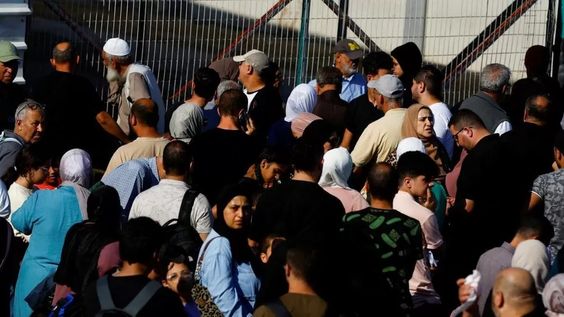Headlines
Thousands of people cross the border between Egypt and Gaza at the Rafah crossing

As diplomatic efforts to open the border crossing at Rafah with Egypt continue, thousands of civilians from Gaza have congregated there in anticipation of Israel’s anticipated ground attack.
The United Nations, however, said that the talks to reopen the bridge had not made any headway.
Israel is accused of “not cooperating” by Cairo.
All exit points from Gaza are blocked off as Israel keeps up its airstrikes in retaliation for the attack by Hamas on October 7.
The second time in less than a week, US Secretary of State Antony Blinken arrived in Israel on Monday.
After visiting six Arab nations in the area, he came back to try and pressure the government to reopen the border crossing so that humanitarian aid could enter and foreign passport holders could be evacuated.
Mr. Blinken and James Cleverly, the foreign secretary of the United Kingdom, both stated that they were collaborating with Israel, Egypt, and “other leading political voices in the region” to reopen the bridge.
In response to the deadly Hamas attack on Israel last week, during which militants raided communities, abducted civilians and soldiers, and killed more than 1,400 people, the Israeli military ordered a blockade of Gaza and cut off the supply of water, food, and fuel before launching a wave of air strikes.
Following news that there might be a brief ceasefire on Monday, throngs of civilians flocked to the Rafah crossing on Monday morning.
Immediately after any such agreement was reported, both Israel and Hamas rejected it.
Later, a BBC reporter in southern Gaza reported that an air strike had struck the vicinity of the crossing, damaging both the road and a building on the Palestinian side of the crossing.
Since it started its air assault against Gaza, Israel has at least three times bombed the region around the Rafah crossing point.
The Israeli embargo on other access routes to the region held by Hamas continues, leaving the bridge as the only feasible route out of Gaza.
As the humanitarian crisis in Gaza worsens, dozens of lorries carrying gasoline and emergency supplies stay on the Egyptian side of the Rafah crossing, waiting for authorization to enter.
According to Israel, the siege won’t end until Hamas releases the captives it kidnapped on October 7 from Israel. Israeli authorities now think 199 persons are detained in Gaza, up from their earlier estimate of 155.
READ ALSO: Israel prepares a massive ground assault on Gaza, Netanyahu promises to “demolish” Hamas
Since the Hamas attack, over 2,750 people have perished in Gaza and more than one million have been displaced.
Egypt’s foreign minister, Sameh Shoukry, stated on Monday morning that it was necessary to ease the suffering of Palestinian residents in Gaza and noted that negotiations with Israel had been unsuccessful.
Cairo has been concentrating on getting aid to Gaza for civilians. According to Mr. Shoukry, Egypt could permit medical evacuations and admit select Gazans with travel authorization.
Many nations, including the US and the UK, have advised their citizens to proceed to the Rafah crossing in preparation for its potential reopening.
Egypt is ready to reopen the Rafah gate so that people with foreign passports may leave and humanitarian aid can enter, but it is afraid of a huge flood of Palestinian refugees escaping the conflict.
This would be intolerable, according to Egypt and other Arab nations, as it would amount to the displacement of Palestinians from their homeland.
